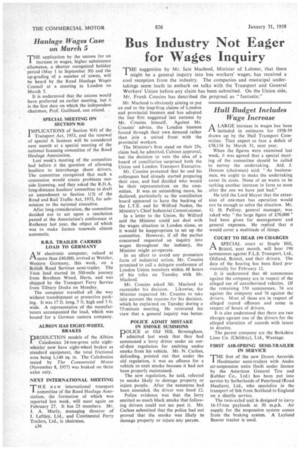Bus Industry Not Eager for Wages Inquiry
Page 32

If you've noticed an error in this article please click here to report it so we can fix it.
THE suggestion by Mr. lain Macleod, Minister of Labour, that there I might be a general inquiry into bus workers' wages; has received a cool reception from the industry. The companies and municipal undertakings seem loath to embark on talks with the Transport and General Workers' Union before any claim has been submitted. On the Union side, Mr. Frank Cousins has described the proposal as "fantastic."
Mr. Macleod is obviously aiming to put an end to the leap-frog claims of London and provincial busmen and has adopted the line first suggested last autumn by Mr. Cousins himself. Against Mr. Cousins' advice, the London busmen forced through their own demand rather than join a united front with the provincial workers.
The Minister's firm stand on their 25s. claim had, he admitted, Cabinet approval, but the decision to veto the idea of a board of conciliation surprised both the Union and London Transport Executive.
Mr. Cousins protested that he and his colleagues had already started preparing their case, and had decided who would be their representatives on the committee. It was an astonishing move, he declared, particularly as the conciliation board appeared to have the backing of the L.T.E. and Sir Wilfred Neden, the Ministry's Chief Industrial Commissioner.
In a letter to the Union, Sir Wilfred said the Minister could not deal with the wages situation in London alone, so it would be inappropriate to set up the committee. However, if all the parties concerned requested an inquiry into wages throughout the industry, the Minister might co-operate.
In an effort to avoid any premature form of industrial action, Mr. Cousins promised to call a delegate conference of London Union members within 48 hours of his talks on Tuesday with Mr. Macleod.
Mr. Cousins asked Mr. Macleod to reconsider his decision. Likewise, the Minister requested Mr. Cousins to take into account the reasons for his decision. which he explained on Tuesday during a 75-minute meeting. He reiterated his view that a general inquiry was better.
POLICE ADMIT MISTAKE IN SMOKE SUMMONS
POLICE at Old Hilt, Birmingham, admitted last week that they had summoned a lorry driver under an outof-date regulation for emitting undue smoke from his vehicle. Mr. N. Carless, defending, pointed out that under the old regulation, it was an offence for a vehicle to emit smoke because it had not been properly maintained.
The new regulation, he said, referred to smoke likely to damage property or injure people. After the summons had been amended, the driver was fined 12.
Police evidence was that the lorry emitted so much black smoke that following drivers could not see past it. Mr. Carless submitted that the police had not proved that the smoke was likely to damage property or injure any pexson.




































































































